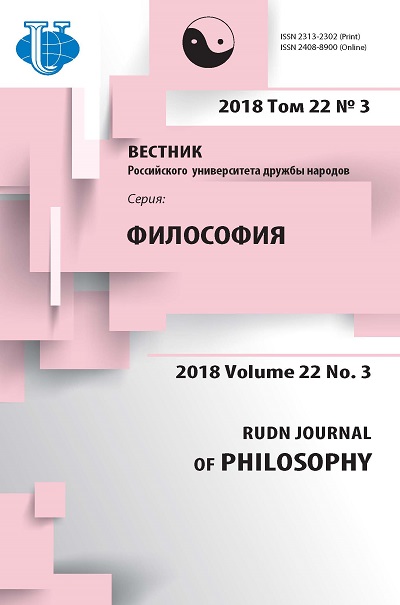ETHICS OF SCIENCE AND RESPONSIBILITY OF SCIENTIST
- Authors: Mukhametzhanova VS1
-
Affiliations:
- Peoples’ Friendship University of Russia (RUDN University)
- Issue: Vol 22, No 3 (2018)
- Pages: 301-309
- Section: THE PROBLEM OF RESPONSIBILITY IN POST-INDUSTRIAL SOCIETY
- URL: https://journals.rudn.ru/philosophy/article/view/19327
- DOI: https://doi.org/10.22363/2313-2302-2018-22-3-301-309
Cite item
Full Text
Abstract
The article considers the notion of science ethics as well as the issue of responsibility of scientists in the modern society. The author discovers such key notions as the ethics of science, the ethos of science, determines the issues of professional and social responsibility of the scientists. Rapid development of scientific and technical progress has resulted in emergence of new problems and moral situations related to ethics. Today’s problem of scientists’ responsibility for results of his/her activities and meaningful elaboration of scientific product is of particular interest for the society. In this article the author separates the notion of the responsibility into two types: external and internal one. The external responsibility is implemented in relationships between science and the society; it is therefore commonly referred to as social one, while the internal one is represented as scientist’s professional responsibility within scientific community. As the author says, the problem of the responsibility of the scientists is closely linked to issues of personal freedom and moral choice. The article establishes basic standards of professional ethics of the scientist, such as prohibition of plagiarism, distortion of the results of scientific research, unselfish search and defense of truth, the problem of freedom of scientific research and social responsibility of the researcher etc. The problem of moral assessment of scientist’s cognitive activities themselves, the used term for which is ethos of science is of special interest for scientific ethics. Robert Merton’s concept determined ethic standards serving for approval and defense of specific scientific values, including unselfish search and defense of truth. Social norms codified in scientific ethos by R. Merton into so-called CODUS are presented by four basic principles - Universalism, Communism, Disinterestedness and the Organized Skepticism. The article also touches the aspects of the scientific responsibility of the researcher. Problems of scientific morality are especially acute for scientists working in the applied research fields, such as gene engineering, biotechnologies, biomedical and gene research of the human etc. As a result of scientific discoveries and the experiments the new “products” of researchers’ activities are created, which consequences are sometimes irreversible not only for the whole mankind but for the science itself. Reinforcement of the accountability of scientists towards the society is also associated with social changes in science itself. Today, scientific and technological revolution changes the orientation of science, shifting it towards learning of social nature of the human. It is important for the scientific community to recognize the professional responsibility not only for the application of obtained results of the activities but for social consequences of it. A special attention should also be drawn to the improvement of monitoring of the activities of modern scientists and the scientific community in total by the public.
About the authors
V S Mukhametzhanova
Peoples’ Friendship University of Russia (RUDN University)
Author for correspondence.
Email: mukhametzhanova_vs@rudn.university
кандидат социологических наук, доцент кафедры этики факультета гуманитарных и социальных наук Российского университета дружбы народов
Miklukho-Maklaya Str., 6 Moscow, Russian Federation, 117198References
- Mishatkina TV, Jaskevich JaS, Vjazovkin VS. Ethics of science. Mishatkinoiy TV and Vjazovkina VS editors. Respubl. Institute of higher education. Minsk; 2002: 58. (In Russ).
- Frolov IT, Judin BG. Ethics of science: problems and discussions. Moscow: Politizdat; 1986: 140, P. 150-159. (In Russ).
- Ponosov FN. Modern philosophical problems of engineering and technical Sciences. Ponosov FN editor. Izhevsk: FGBOU VPO Izhevskaja GSHA; 2013:71. (In Russ).
- Lazar MG. Ethics of science as a new scientific direction of sociology of science. Journal of sociology and social anthropology. Saint-Petersburg: 2001;(3). (In Russ).
- Philosophical dictionary. 7th ed. Moscow: Respublika; 2001. P. 719.
- Digital library of Institute of philosophy RAS. Available at https://iphlib.ru/greenstone3/library. Accessed: May 17, 2018.
- Lebedev SA. Philosophy of science: dictionary of main terms. M.: Akademicheskii Proekt; 2004. 312-313, 133. (Ser. «Gaudeamus»). (In Russ).
- Tsvyk VA. Professional ethics: foundations of a General theory. Tsvyk VA editor. Moscow: RUDN; 2012:32-133. (In Russ).
- Merton RK. The sociology of science: Theoretical and empirical investigations. Ed. and with an intro by Storer NW. Chicago and London: The University of Chicago Press; 1973. P. 267-278.
- Judin BG. Ethics of science. In: Ethics: encyclopedic dictionary. (ed.) Apresyan RG, Gusejnov AA. Moscow; 2001: 593. (In Russ).
- Demina NV. The concept of the ethos of science: Merton and others in search of social geometry norms. Sociological journal. 2005; (4):9. (In Russ).
- Kochergin AN. Scientific creativity: problems of social responsibility and stimulation. Scientific Bulletin MGTU GA. 2010; (155):41. (In Russ).
- Frolov IT, Judin BG. Ethics of science: problems and discussions. Moscow: Politizdat; 1986: 160, 166-167. (In Russ).
- Gabdulova NN. Ethical problems of science. Proceedings of the Pskov Polytechnic Institute. 2008; (12.1):34. (In Russ).
- Bogatov VV. Ethics in scientific activity. Bulletin DVO RAN. 2008; (1):152. (In Russ).
- Tsvyk VA, Savvina OV. Publication ethics in the context of scientific ethics // Foster J.A., Lutton E., Miller J., Ryan C., Tettamanzi A.G., editors. Genetic programming. EuroGP 2002: Proceedings of the 3d International Multidisciplinary Scientific Conference on Social science and Arts SGEM; 2016 Aug 22-31; Albena. Bulgaria: Stef92 Technology; 2002. P. 791-797.
















